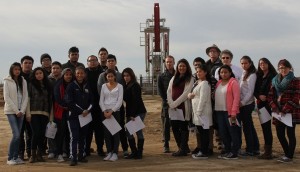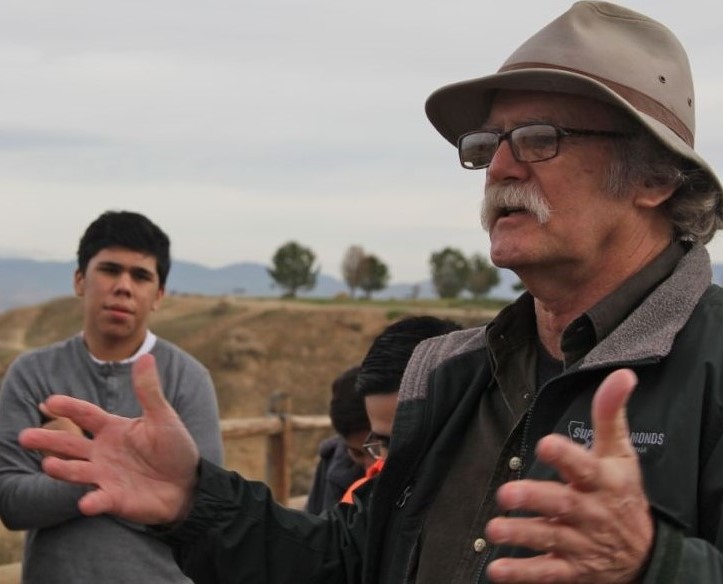Twenty-one seniors from King-Chavez Charter High School’s Environmental Justice class made the long trek to Kern County in California’s Central Valley to view the effects of the oil industry, and fracking in particular, on the land and the residents of the region.
SD350’s Peg Mitchell recently organized an eye-opening trip to the oil fields of Kern County for some of San Diego’s high-school students. Here are some excerpts from the report she sent back:
Friday, December 19th, was the last day of the term for students at the King-Chavez Charter High School in San Diego. Twenty-one seniors from the Environmental Justice class trekked in the dark to board a school bus at 6AM for a long trip to the oil fields of Kern County. They had signed on to witness for themselves the impact of of the oil and gas industry, and fracking in particular, on the communities nearby.

Tom Frantz from Association of Irritated Residents (Great name!) began the tour at the “Panorama Overlook”, breathtaking for its view of oil pump jacks in every direction as far as the eye can see. Among the rigs students could spot an occasional power plant, used for heating up water into steam to use in the “cyclic steam injection” process – an older method for releasing the tarry oil to flow up the wellhead an out to the pipelines.
“On many days of the year Bakersfield has the worst air quality in the country,” Tom told the students. “Why doesn’t anyone do anything about that?” asked one. Tom explained the connection between appointments to the air quality boards, the legislative representatives in that area, and the oil companies. “It’s all politics,” he explained, “so nothing ever changes.”

A retired high school Math teacher, Tom doesn’t accept this status quo. He spends his time traveling around the Kern County oil fields checking up on activities of the oil production industry. He has caught drillers illegally dumping highly polluted toxic “produced water” from fracking operations into fields; he has teamed with other organizations from Texas using special cameras to film methane and other pollutants as they leak from pump sites and compressor stations; and he has discovered leakage and resulting air pollution from open evaporation pits that contain all the waste from oil and gas operations.
Continuing on their bus tour, students witnessed oil rigs placed amidst agricultural fields and one right next to an elementary school, near the town of Shafter. Next to the school, a gardener turned over soil in the community garden situated in the rig’s shadow. Children at the school suffer from numerous health problems, particularly asthma and respiratory issues.
Across the valley to the West, the tour drove through the heart of Kern’s agricultural areas. Students learned that not only are the oil and gas operations a hazard to public health but, incredibly, so are dairy farms – including one that had 15,000 cows on site, standing in their own waste as far as the eye could see. This waste is yet another hazard as it is moved into open pits where it is occasionally “stirred up” to help release 50% of the ammonia its decay generates into the air. The remaining solid waste is just piled up into mountains of …
The last stop on the tour was a history lesson: the Belridge Oil fields and the towns of McKittrick and Taft are best known as being the location as well as subject matter of the movie “There Will Be Blood” – a movie about the beginnings of the oil industry in California and the cutthroat dealings that went on to secure land and drilling rights.
Asked about their biggest learning from their Kern County tour, the students’ almost unanimous reply was the proximity of oil drilling to where our food is grown. The potential hazard to our food source raised great concern among the students. “No doubt the crops are contaminated, at a minimum from air pollution” Tom explained. “But no one really knows,” he said, “because no one tests for anything, because no one really wants to know.”
Because of what they witnessed, these 21 seniors from King-Chavez High School now have strong, disturbing images of the impact that industrialization of the valley has had on the nearby communities, the school children, and even the food they themselves eat. They also have a clear sense of what “environmental justice” means and are, therefore, determined to stay engaged in this issue and help SanDiego350 in future efforts to inform the public.
